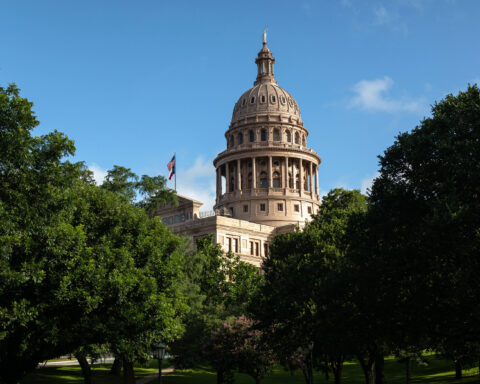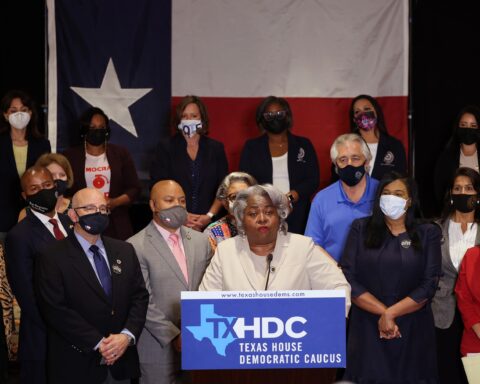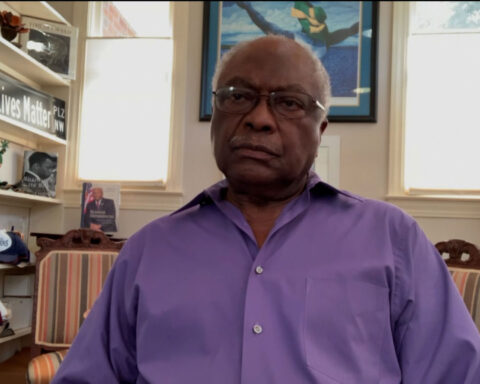As the Texas legislature enters the final week of its special session, state Democrats are bringing in reinforcements from around the country to Washington, DC, in a final push to pressure federal lawmakers to pass voting rights legislation.
Beginning Monday, more than 100 Democratic state legislators will fly into the nation’s capital as part of a planned “week of action” centered on convincing US senators to forgo their August recess until the upper chamber passes the For the People Act, the sweeping Democratic voting and election bill shot down by Senate Republicans earlier this year.
The lawmakers, who hail from at least 20 states, will kick off their advocacy campaign with a rally on Tuesday in the nation’s capital.
According to organizers, there will be “a series of events and meetings with federal lawmakers throughout the week to underscore the urgent need to pass legislation protecting the right to vote before the end of summer and undo anti-voter laws in time for the 2022 midterm elections.” The events are being planned by Declaration of American Democracy, a coalition of activist groups pushing for passage of the For the People Act.
“The Big Lie has infected nearly every state legislature in the county, giving rise to a calculated and brazen assault on the freedom to vote. Texas has always been a hotbed for the worst anti-voter laws in the country, but this time it’s worse than ever,” said Texas state Rep. Trey Martinez Fischer, a Democrat from San Antonio. “We came to Washington, D.C. to demand action and draw the nation’s eyes to the fight for the freedom to vote. Now, we are heartened to welcome over 100 state legislators from across the country to share their stories and call on Congress to save our country by passing the For the People Act and the John Lewis Voting Rights Act.”
Eighteen states have enacted 30 new laws that make it harder to vote, according to a tally by the liberal-leaning Brennan Center for Justice that tracks state activity through July 14.
Many of the lawmakers will be coming in from states where Republican-controlled legislatures have already passed restrictive election legislation into law this year, like Georgia, Arizona and Florida.
“They shouldn’t take a recess. Democracy comes first. My request is, recess can wait. Democracy can’t,” said Florida state Sen. Annette Taddeo, who plans to spend three days this week lobbying members of Congress. The Miami-Dade Democrat told CNN the night before her planned flight to Washington that she didn’t think there was time for the Senate to “play the long game” when it comes to voting rights.
“Redistricting… this federal bill would really take the politics out of it, which has been the problem when it comes to the maps. Especially at this juncture that we’re at with redistricting with new numbers coming out from the Census and all of us getting ready for the process in state legislatures,” Taddeo said.
Arizona state Rep. Daniel Hernandez tells CNN he will be one of close to a dozen state lawmakers flying in this week from his state, where restrictive laws have been passed and the partisan, so-called “audit” of Maricopa County ballots continues.
“We made, I think, a really valiant effort to try to stop these really awful bills at the legislative level here in Arizona and in Texas and in Georgia,” said the Tucson Democrat, who explained voting rights is what got him into state politics more than a decade ago in Arizona. “Now that we weren’t able to stop these bills at the legislative level in our different states, lawmakers across the country are flying to DC because there is nothing more important than protecting people’s right to vote.”
Last week, several state-level Democrats held virtual meetings with Texas Democrats — who shifted plans after at least six state representatives tested positive for Covid-19 — swapping stories about legislation and organizing efforts. Taddeo praised the plan for this week, noting that Florida Democrats didn’t have the option to block a restrictive bill in their state from becoming law earlier this year by organizing a walk out like Texas Democrats have done.
More than 50 Texas Democrats flew to Washington on last month in an effort to block restrictive voting legislation by breaking quorum. The Texas House cannot legally do state business without a quorum present. They killed another version of the voting overhaul bill in May, when they broke quorum in the final moments of the regular session.
The Texas special session ends Friday, but Texas Gov. Greg Abbott has vowed to immediately call another session when this one ends. Republicans have called the quorum break a “political stunt” and publicly called on the Democrats to return and “do their jobs” in Austin.
The quorum-breaking Democrats have yet to secure a sit down with President Joe Biden, but have held two meetings with Vice President Kamala Harris and dozens of others with members of Congress to urge them to pass federal voting rights legislation.
CNN reported last week that several Senate Democrats are working to craft a revised voting rights bill compromise aimed at continuing their work on the issue after Senate Republicans blocked the earlier bill from advancing.
But the legislative reality remains: There is currently no Republican support in the US Senate for voting rights legislation. A number of Senate Democrats, including Sens. Joe Manchin of West Virginia and Kyrsten Sinema of Arizona, have opposed dismantling the filibuster rules to allow their party to advance legislation by a simple majority with Harris casting the tie-breaking vote.
Hernandez said he hopes to meet with his state’s senators while in Washington. He is quick to note that both Arizona senators were co-sponsors of the For the People Act, saying he believes Kelly and Sinema — even with her position on the filibuster — are committed to protecting voting rights.
“I think the dynamic has changed significantly just in the past couple weeks, which is why we are coming to talk to our senators in DC and make this case: we have tried everything at the legislative level and this is still what is happening,” said Hernandez, referencing restrictive voting laws passed in Arizona. “Right now, this is it. This is the moment if we are going to get anything done on voting rights.”







